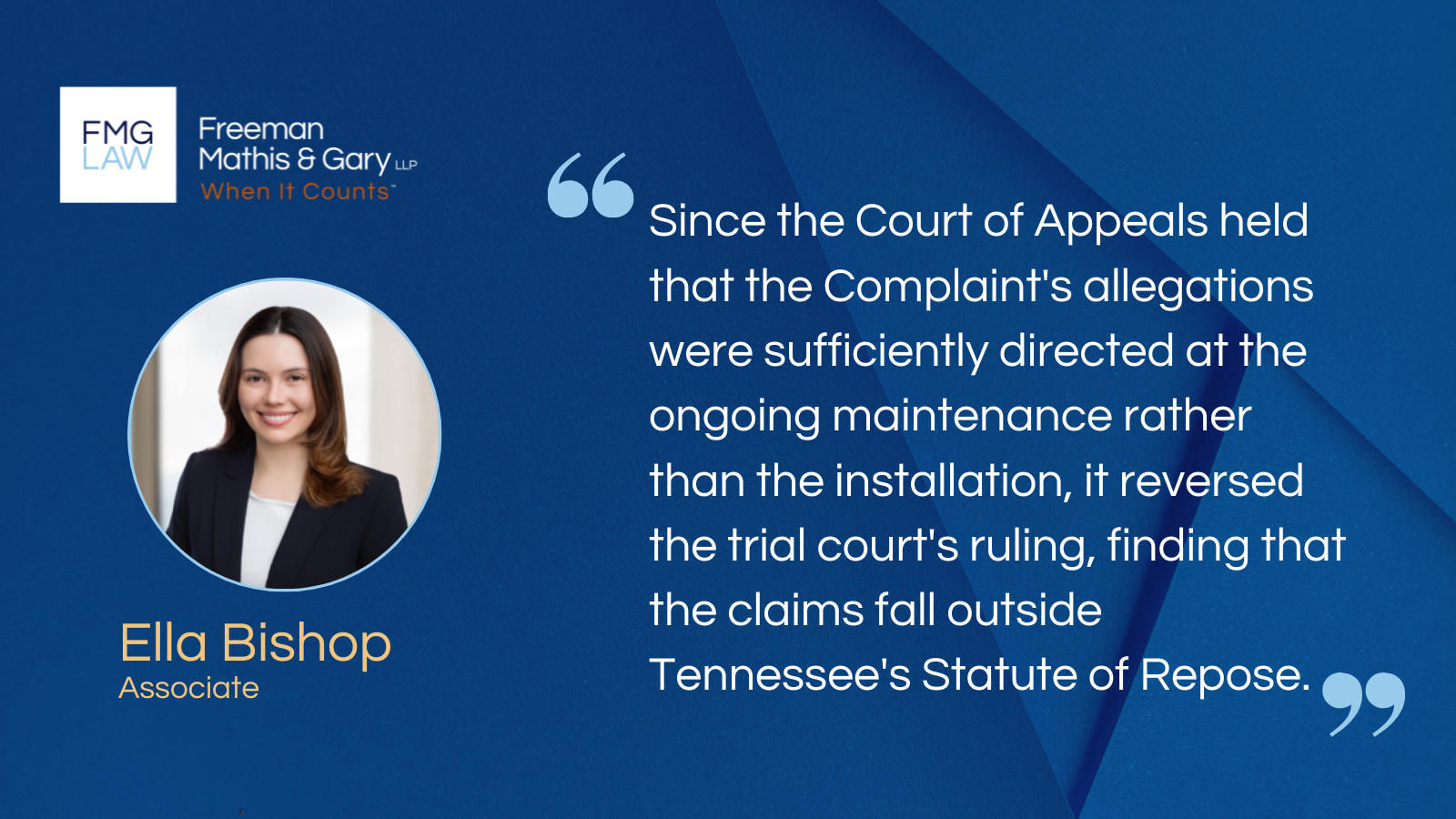BlogLine
Tennessee’s Statute of Repose: A possible exception for construction and maintenance contracts
7/17/25

By: Ella A. Bishop
In Tri-State Insurance Company of Minnesota A/S/O Campus Chalet, Inc. v. East Tennessee Sprinkler Company, Inc., 2024 WL 5088467 (Tenn. Ct. App. Dec. 12, 2024), the Tennessee Court of Appeals addressed whether Tennessee’s Statute of Repose applies when a case arises out of both the installation and maintenance of a defective system.
The facts giving rise to this matter began in 1992, when the East Tennessee Sprinkler Company, Inc. (“ETS”) agreed to install a sprinkler system at Campus Chalet. Following the installation, ETS and Campus Chalet became parties to a contract, wherein ETS became responsible for the “ongoing inspection, repair, and maintenance of the system.” On Oct. 7, 2020, a waterline burst in the sprinkler system, causing Campus Chalet significant property damage.
In response to the burst waterline, Tri-State Insurance Company of Minnesota a/s/o Campus Chalet (“Tri-State”) filed a complaint against ETS, alleging both negligence and breach of contract. Specifically, Tri-State alleged that ETS failed to properly inspect, test, and maintain the sprinkler system since the initial installation. Further, Tri-State contends that ETS should have identified and detected the sloping issues, which they assert gave rise to the system failure, during their years of maintenance.
On Nov. 22, 2023, ETS filed a Rule 12.02(6) motion to dismiss, alleging that the claims were time-barred under Tennessee’s Statute of Repose. Tennessee’s Statute of Repose states that all actions to recover damages for any deficiency in design or for injury to property arising out of that deficiency must be brought within four years after substantial completion of an improvement. Tenn. Code Ann. § 28-3-202. The trial court heard ETS’s motion and granted it. In assessing this motion to dismiss, the trial court determined that Campus Chalet’s cause of action “arose during the ‘design, planning, supervision, observation of construction, or construction of an improvement to real property, namely a sprinkler system, ‘ which was installed in 1992.” On April 24, 2024, Tri-State filed its timely notice of appeal.
In assessing this appeal, the Tennessee Court of Appeals determined that the critical question was whether the trial court correctly interpreted the complaint as it relates to the Statute of Repose. To determine if these claims arose out of matters barred by the Statute of Repose, the Court of Appeals undertook a critical assessment of the language of the Complaint. Ultimately, the Court of Appeals found that “a plain reading of the complaint reveals that the essence of Tri-State’s allegations arose out of ETS’s ongoing maintenance of the system, and alleged deficiencies.” Since the Court of Appeals held that the Complaint’s allegations were sufficiently directed at the ongoing maintenance rather than the installation, it reversed the trial court’s ruling, finding that the claims fall outside Tennessee’s Statute of Repose. On June 2, 2025, the Tennessee Supreme Court granted ETS’s application for permission to appeal.
This decision demonstrates that a Plaintiff may be able to plead around Tennessee’s Statute of Repose. Specifically, in instances where the Defendant provided both installation/construction services as well as ongoing maintenance, Plaintiff may be able to proceed with their case if they are able to tailor their claims to focus only on the maintenance portion of the contract. The Tennessee Supreme Court’s upcoming decision on this matter will determine if such an exception is recognized under Tennessee’s laws.
For more information, please contact Ella A. Bishop at ella.bishop@fmglaw.com or your local FMG attorney.
Information conveyed herein should not be construed as legal advice or represent any specific or binding policy or procedure of any organization. Information provided is for educational purposes only. These materials are written in a general format and are not intended to be advice applicable to any specific circumstance. Legal opinions may vary when based on subtle factual distinctions. All rights reserved. No part of this presentation may be reproduced, published or posted without the written permission of Freeman Mathis & Gary, LLP.
Share
Save Print
